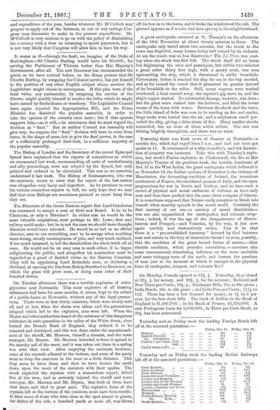Yesterday there was fresh news of disaster at Newcastle—a terrible
fire, which had raged from 7 a.m., and had not been got tinder at 11. It commenced at a ship chandler's, and the destruc- tion of property was immense. Take this with Tuesday's explo- sion, last week's Fenian explosion at Clerkenwell, the fire at Her Majesty's Theatre of the previous week, the terrible hurricane of Oct. 31 in the West Indies, the great earthquake which followed it on November 18, the Indian cyclone of November 2, the violence of Manchester, the detonating condition of Ireland, the tremulous excitement of France, the smothered position of Italy, and the open preparations for war in Servia and Turkey, and we have such a crowd of physical and moral outbursts of violence as have only now and then been packed into the same short compass of history. It is sometimes supposed that Nature really conspires to break into tumult when anarchy spreads in the moral world. Certainly the first century of our era—a century of moral dissolution— was one also unparalleled for earthquakes and volcanic erup- tions ; indeed, it was the age of the disappearance of Hercu- laneum and Pompeii,—and Vesuvius, by the way, is just now again terribly and destructively active. Can it be that there is a "pre-established harmony" decreed by God between man and nature in the fury of destructive forces? or even, possibly, that the condition of the great bound forces of nature,—that electric condition, which precedes convulsion, — exercises also some unconsciously stimulating influence on the more excitable and more unhappy races of the earth, and loosens the passions of man just at the moment at which it emerges in the physical force of earthquake, tempest, and volcanic fire?






































 Previous page
Previous page